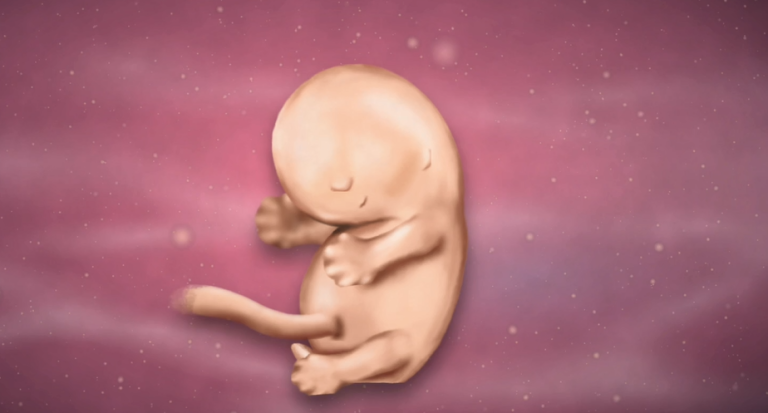You have recently received the wonderful news that you are pregnant, as you step into the sixth week, exciting changes are underway for both you and your baby. Many women discover their pregnancy around this time, making it a crucial period for understanding what lies ahead. From essential nutrition and suitable exercises to decoding early pregnancy symptoms, this article provides a comprehensive guide. Gain insights into your baby’s development and explore a helpful pregnancy checklist to ensure a healthy and well-prepared journey. Whether you’re a first-time parent or seeking valuable information, this guide covers all aspects of the sixth week of pregnancy. Get ready for this incredible chapter in your life!
Your Baby at Six Weeks
When you reach the sixth week, you may wonder about your baby’s development, weight, length, the development of his organs, organ systems and senses, what skills he gains, etc.
Discovering Your Baby’s Growth at Six Weeks
In the sixth week of pregnancy, marvel at the remarkable development of your baby. Although currently the size of a pea, this tiny wonder has nearly tripled in size since last week. While it’s challenging to measure weight accurately at this stage, an ultrasound will reveal the Crown-Rump Length (CRL) of your baby. This measurement, taken from the crown of the head to the bottom, accommodates the bent legs of the growing embryo. At this early stage, seeing your baby on ultrasound might still be a delightful surprise. Currently, your six-week-old embryo averages between 5-6 mm in length, showcasing the incredible progress within this short span. Witness the miraculous journey of your little one as you embrace the sixth week of pregnancy.
The approximate size of a six-week-old embryo:
| Gestational Age | Length |
| 6th week | 5-6 mm |
Development of Your Baby’s Organ Systems and New Skills
Although it is only the size of a pea, the embryo begins to form many organ systems and organs this week:
At the size of a pea, your baby, though tiny, initiates the formation of crucial organ systems during the sixth week:
- The Nervous System: The embryo kickstarts the development of brain hemispheres, nerve cells, and the spinal cord, witnessing rapid multiplication of nerve cells.
- The Endocrine System: The pituitary gland emerges, a pivotal player in secreting essential hormones. Hormone transfer from your blood to the embryo is facilitated through the placenta until the baby’s endocrine system is fully functional.
- The Circulatory System: Your baby’s heart, evolving from a tube-shaped structure, begins to assume its standard four-chambered shape. Though measuring just 2 mm, it vigorously pumps blood at a rate of 100-160 beats per minute, a rhythm you may soon hear in upcoming ultrasounds.
- The Digestive System: The pancreas, stomach, gall bladder, and liver commence their formation, ensuring your baby’s nourishment via the placenta until their digestive system is ready to take over.
- The Respiratory System: The lungs embark on development, with each lung resembling a tube that will later form branches and alveoli. Full maturation of the respiratory system occurs in the final weeks of pregnancy.
- The Musculoskeletal System: Limb buds emerge, laying the foundation for arms, legs, hands, and feet, with muscles gradually taking shape.
- The Urinary System: Intestinal development commences, and waste elimination is managed through the umbilical cord until the kidneys and intestines are fully operational.
- The Reproductive System: While reproductive organ formation begins around week ten, this aspect takes time to unfold.
- Baby Movements at Six Weeks: Though subtle, your baby remains in a C-position within the uterus, with more pronounced movements expected as limbs grow in the coming weeks. Though imperceptible, this period marks the crucial inception of your baby’s intricate organ development.
A Glimpse into a Six-Week-Old Embryo’s Emerging Senses
Amidst rapid development, an embryo’s sense organs take shape, offering a preview of sensory capabilities:
- The Eyes and the Sense of Sight: Two dark “cups” materialize on the head, while the corneas, lenses, and eyelids commence development, laying the groundwork for future sight.
- The Ears and the Sense of Hearing: Ear cavities appear on both sides of the head in the form of ear canals, a precursor to the development of the sense of hearing.
- The Tongue and the Sense of Taste: While the mouth and tongue are yet to form, the groundwork for the sense of taste is laid.
- The Nose and the Sense of Smell: A nasal protrusion takes shape on the front of the embryo’s face, marking the beginning of olfactory development.
- The Skin and the Sense of Touch: Protrusions representing arms, legs, and shoulders emerge, resembling a tiny pink piece of flesh. While there is no skin layer yet, these developments hint at the eventual sense of touch.
In this intricate symphony of growth, your baby’s senses lay the foundation for a rich and vibrant interaction with the world.
How Many Months Is Your Six-Week-Old Baby?
While gestation is typically measured in weeks, the desire to understand pregnancy in terms of months is natural. Here’s a simple calculation to offer clarity:
- Six weeks equate to 6 × 7 days, amounting to 42 days.
- Dividing 42 by the average number of days in a month (30) results in 1 month and 12 days.
By this calculation, you find yourself in the second month of your pregnancy, providing a more relatable perspective on your exciting journey to motherhood.
Your Body at Six Weeks of Pregnancy
Tips for Managing Symptoms
The surge in hormones during pregnancy can present challenges, but with some practical tips, you can enhance your comfort:
1. Prioritise Rest:
Listen to your body and prioritise rest when feeling fatigued. Take naps and ensure sufficient sleep to combat constant sleepiness.
2. Choose Comfortable Attire:
Opt for loose-fitting bras and underwear to alleviate intense breast tenderness. Consider adjusting your bra size if needed.
3. Minimise Strain:
Avoid sudden movements, heavy lifting, and excessive exertion. Gradual movements and pacing yourself can help minimise discomfort.
4. Address Vaginal Bleeding Concerns:
If you experience vaginal bleeding after intercourse, communicate openly with your partner about gentler movements. Any concerns should be promptly discussed with your doctor.
5. Multivitamin Consultation:
Discuss the use of a multivitamin with your doctor to ensure adequate energy levels. Seeking professional advice will guide you in choosing a suitable supplement.
Empower yourself with these tips to navigate through the exciting yet challenging aspects of pregnancy. Always communicate openly with your healthcare provider for personalised guidance.
Managing Weight and Nutrition at Six Weeks Pregnant
Expectant mothers often wonder about weight gain in early pregnancy. While significant weight gain is expected in later stages, the sixth week doesn’t necessitate substantial increases. Your baby is still tiny, and visible changes are minimal. Focus on a balanced diet and avoid excessive weight gain in these early months.
Nutritional Guidelines at Six Weeks:
- Hydration is Key: Increase fluid intake to 2.5−3 litres daily as your baby’s growth escalates.
- Mindful Food Choices: Steer clear of overly oily and spicy foods to prevent stomach discomfort.
- Caffeine Caution: Limit tea and coffee, keeping caffeine intake below 200 mg daily. Excessive caffeine during the first trimester can lead to developmental issues.
- Consult Your Doctor: Seek guidance from your doctor on foods to avoid during pregnancy.
- Safe Meat and Fish Consumption: Ensure thorough cooking of meat and fish. Avoid raw varieties like deli meat and sushi.
- Proper Handling of Produce: Wash raw vegetables and greens meticulously, soaking them in vinegar water and rinsing well.
- Avoid Overeating: Refrain from “eating for two” immediately. The first trimester doesn’t require extra calories; focus on a nutrient-dense, low-calorie diet.
Prioritising these nutritional aspects lays a foundation for a healthy pregnancy and eases early symptoms. Always consult your healthcare provider for personalised advice.
Exercise at Six Weeks of Pregnancy
Engaging in exercise during pregnancy offers numerous benefits, including muscle strengthening, weight control, and overall well-being. It’s crucial to discuss your exercise plan with your healthcare provider for tailored guidance.
Recommended Six-Week Pregnancy Exercises:
- Pregnancy pilates
- Pregnancy yoga
- Gentle walking
- Swimming
- Stretching and relaxation movements
The first trimester, when most miscarriages occur, demands extra caution. As the embryo attaches to the uterine wall during this period, careful movement is essential. Consult your doctor to obtain approval for your exercise routine. If your pregnancy is high-risk or you face a risk of miscarriage, refrain from intense and exhaustive workouts. Prioritise your health and well-being during this crucial phase!
Click here to discover maternity leggings for your exercises: https://ebebek.co.uk/collections/maternity-leggings
Six-Week Pregnancy Checklist
Ensure a smooth start to your pregnancy journey with these key considerations during the sixth week:
- Educate Yourself: Dive into resources about pregnancy and parenthood through books and articles to prepare for the upcoming changes.
- Quit Harmful Habits: If you engage in harmful habits like smoking or alcohol consumption, take steps to quit and prioritise the health of your baby.
- Choose a Trustworthy Obstetrician: Select a reputable obstetrician whom you trust for your prenatal check-ups.
- Schedule First Examination: If you haven’t already, promptly schedule your initial pregnancy examination with your doctor.
Remember, this is the beginning of an exciting adventure. Embrace both the physical and mental changes occurring and relish every moment of this remarkable journey!
As you navigate through the sixth week of pregnancy, your body and baby are undergoing significant changes. From the development of vital organs to managing pregnancy symptoms, it’s a period of adaptation and growth. Take this time to focus on healthy habits, stay informed, and prepare for the transformative journey ahead. Celebrate the milestones, prioritize self-care, and look forward to the coming weeks of this extraordinary pregnancy experience.







